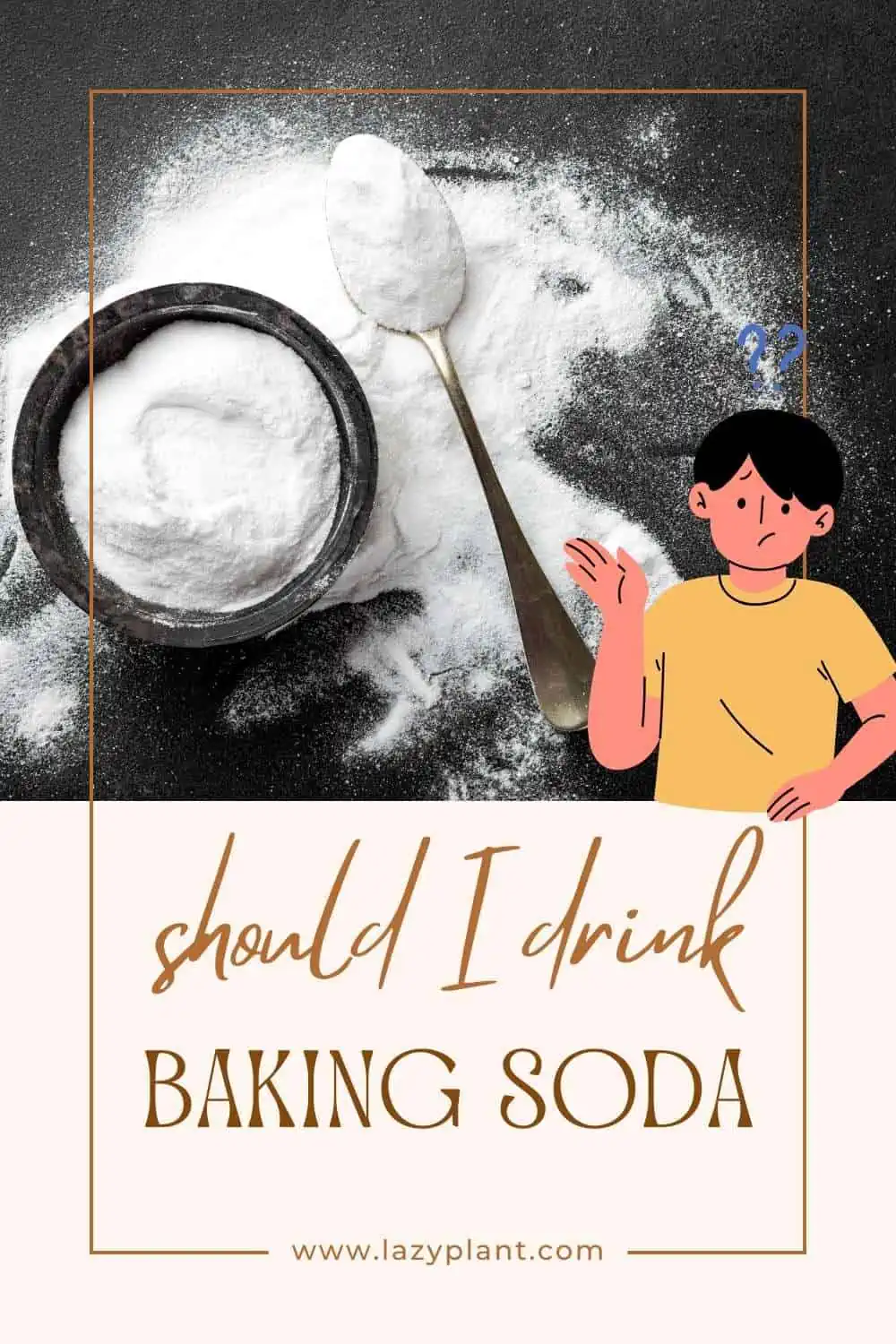Healthy people can drink up to 1/4 tsp of baking soda in a glass of water a day, while the maximum safe intake of baking soda is 1/2 tsp a day. Too much baking soda may lead to stomach disturbances and many other side effects!
Is Baking Soda Edible?
Baking soda, also known as sodium bicarbonate, is edible. Most people can consume 1/2 tsp of baking soda a day without any adverse effects.
The human body can naturally synthesize sodium bicarbonate (baking soda)! The stomach, pancreas, and kidneys pull salt, water and carbon dioxide from the blood to naturally produce baking soda.[1]
Most noteworthy, you shouldn’t confuse baking soda with washing soda, which is highly toxic! Washing soda isn’t edible. It can irritate the skin, eyes, and respiratory tract!
Health Benefits of Baking Soda!
Baking soda has gained popularity because it has a highly alkaline PH of 8!
Baking soda is supposed to provide relief from indigestion and heartburn, protect the intestines, and improve sports performance. Also, it may act as a mild deodorant, whiten teeth, and relieve the skin from sunburns!
Furthermore, baking soda removes pesticide residues from fruits and vegetables! You can wash them with a baking soda solution.
What’s the Recommended Daily Intake?
Most healthy adults can safely consume small amounts of baking soda. As a rule of thumb, the recommended daily intake of baking soda is half a tsp a day. It’s highly recommended to dissolve baking soda in an 8 fl oz glass of water to avoid ingestion issues.
Certainly, pregnant women, kids, people with health issues, and people who take drugs should consult their physician before drinking baking soda.

Can I Drink Baking Soda Every Day?
In most cases, drinking small dosages of baking soda is not dangerous.
You better start consuming pretty small doses, though. Ideally, consume less than 1/4 tsp of baking soda a day for a couple of weeks. Only if you don’t experience any adverse effects, you should increase your daily intake to half a tsp a day.
Much higher doses may be dangerous. In any case, consult your physician before drinking baking soda for a long time!
Can Drinking Too Much Baking Soda Be Dangerous?
Actually, drinking too much baking soda may cause mild side effects, such as diarrhea, stomach disturbances, gas, headaches, nausea, swelling, or vomiting.
Furthermore, you shouldn’t drink a baking soda solution too quickly, or when you’re full, in order to avoid any digestive discomfort!
Moreover, baking soda (sodium bicarbonate) significantly increases your daily sodium intake. High doses of sodium are bad for your health. Although sodium is essential for life, too much sodium can lead to fluid retention, weight gain, high blood pressure, build-up of plaque in blood vessel walls, and eventually to heart disease!

Half a tsp of baking soda contains 630 mg of sodium. According to the American Heart Association, the maximum safe intake of sodium should be only 2,300 mg a day. Smaller dosages of 1,500 are preferable.[2,3]
The main source of sodium in your diet is table salt. Half a tsp of salt contains 1,150 mg of sodium.
People who avoid salt should avoid baking soda as well.
In any case, you shouldn’t exceed the recommended baking soda dose, which is half a tsp a day. Much higher doses can be toxic and cause serious adverse effects.
Baking soda is cheap. You can find it on Amazon for less than $3.
Beverages with Baking Soda
Baking soda is not a common ingredient in beverages because it has a very distinct, slightly salty taste that wouldn’t be pleasant in most drinks. It reacts with acids to produce carbon dioxide gas. Although this might be useful for creating fizz, most carbonated beverages use other methods, like adding carbon dioxide directly.
However, in some homemade sports drinks or electrolyte replenishment drinks, a tiny amount of baking soda might be used to slightly neutralize the acidity of other ingredients (like citrus fruits). Moreover, some people use baking soda mixed with water as a home remedy for indigestion. This is not a mainstream practice and should be done with caution.
Internal Uses (with caution)
A common home remedy involves mixing a small amount of baking soda (around ¼ teaspoon) in a glass of water to neutralize stomach acid and relieve heartburn or indigestion.
However, this should be done occasionally and with caution. It can disrupt your body’s natural pH balance and lead to other problems with frequent use.
Consulting a doctor for persistent heartburn or indigestion is always advisable.
External Uses
Adding baking soda to a bath can help soothe itchy skin caused by conditions like eczema or insect bites.
Also, consult a doctor if you have any concerns about skin sensitivities.
Soda Beverages
Soda beverages (also known as soft drinks or pop) typically do not contain baking soda.
Soda gets its fizz from dissolved carbon dioxide gas, not from a chemical reaction with baking soda. Adding baking soda to a liquid would create some fizz due to the reaction with acids, but it wouldn’t be as controlled or long-lasting as the carbonation process used in commercial soda production.
Baking soda (sodium bicarbonate) and carbon dioxide (CO₂) are related, but they are distinct substances.
Baking soda is a stable compound that can decompose or react under certain conditions. When baking soda reacts with an acid (like vinegar or lemon juice), it releases carbon dioxide gas and water. This is the chemical reaction that causes baked goods to rise.
Baking Soda (Sodium Bicarbonate):
- Chemical Formula: NaHCO₃
- White crystalline powder at room temperature
- Slightly soluble in water
- Weak base (alkaline)
- Reacts with acids to produce carbon dioxide gas and water
Carbon Dioxide (CO₂)
- Chemical Formula: CO₂
- Colorless gas at room temperature and pressure
- Odorless and tasteless
- Denser than air
- Soluble in water under pressure (creates fizzy drinks)